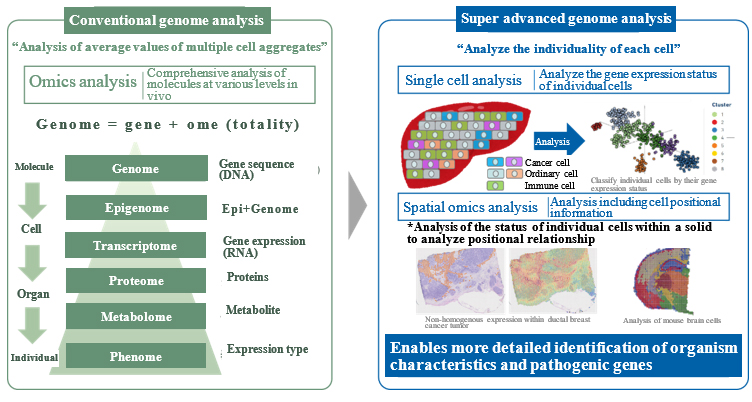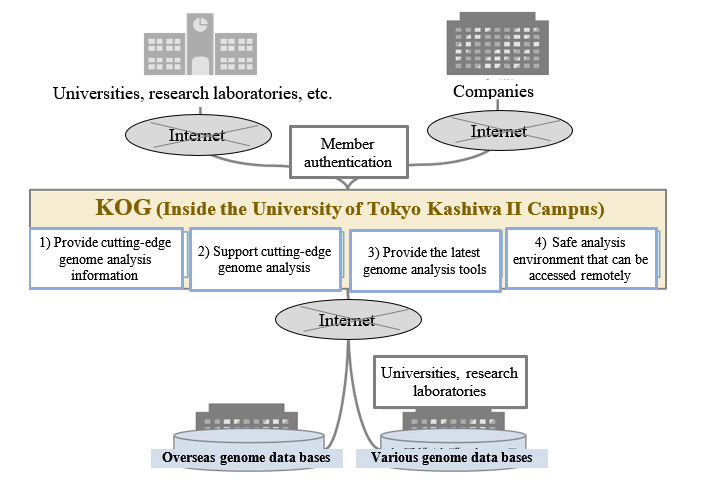–Genome Research Development and Formation of a Leading Life Sciences Center for Japan–
Full operation of Kashiwa-no-ha Omics Gate, providing the first super advanced genome analysis services in Japan
–Contributing to the establishment of treatment for many patients with cancer, etc.–
March 18, 2021
Kashiwa-no-ha Omics Gate
Mitsui Fudosan Co., Ltd.
The Graduate School of Frontier Sciences at the University of Tokyo
Tokyo, Japan, March 18, 2021 - Mitsui Fudosan Co., Ltd., a leading global real estate company headquartered in Tokyo, will establish Kashiwa-no-ha Omics Gate (Kashiwa City, Chiba Prefecture; Representative Director: Sumio Sugano, Professor Emeritus of the University of Tokyo; “KOG”) with the aim of contributing to the advancement of genome-related research in Japan. The foundation will launch full-scale operation of Japan’s first super advanced genome analysis platform and provide comprehensive genome analysis services.
The field of genome-related research is currently gaining attention worldwide. Meanwhile, in Japan, the local environment has been less conducive to research advancement than overseas, due to restrictions on the accumulation of knowledge regarding genome analysis and methods of access to data for security reasons.
To advance genome-related research in Japan, KOG has partnered with the Life Science Data Research Center of the Graduate School of Frontier Sciences at the University of Tokyo (the University of Tokyo) and genome data gathering institutions in Japan and overseas to launch comprehensive services providing cutting-edge genome analysis infrastructure, a remotely accessible analysis environment, and so forth.
Specifically, the Company will offer membership-based services based on “provision of information related to world-leading genome analysis technologies,” “support for cutting-edge genome research,” and “provision of a stable genome analysis environment with remote access availability.” Multiple companies and academic users have already started using the services, and the Company will now seek to enroll new members who will advance medical and pharmaceutical research through genome research. By further strengthening links with top-level academia in Japan, the Company will promote use of cutting-edge genome analysis technologies such as single cell and spatial omics analysis. This is expected to lead to the establishment of treatments for many patients, including cancer patients.

■ Overview of Kashiwa-no-ha Omics Gate ( https://www.kog.or.jp )
KOG provides comprehensive support services for genome analysis conducted in various research by companies and research institutions. The foundation’s representative director is Sumio Sugano, professor emeritus of the University of Tokyo and specially appointed professor of the Future Medicine Education and Research Organization of Chiba University. The directors are Hideki Kanbara, honorary fellow of Hitachi, Ltd. and President of Frontier Biosystems, Inc., and Kazunori Yamashita, Executive Officer and General Manager of the Kashiwa-no-ha Urban Planning and Development Department.
In genome analysis, the movement and analysis of large volumes of data have been significant challenges; however, KOG will build an infrastructure to provide access to global genome-related data bases and enable ready use of data analysis. In December 2020, KOG also concluded a memorandum with the National Bioscience Database Center (NBDC) for operation of “servers outside the institution.” This means that the data managed by NBDC can be used by computers provided by KOG as a “server outside the institution,” the third such case within Japan. Members will be able to use analysis infrastructure as well as use genome analysis tools, connect to external data bases, and receive cutting-edge advanced genome analysis and support advanced by global research centered on academia.

■ Service features( Details are provided on the KOG website https://www.kog.or.jp )
- Provision of information related to world-leading genome analysis technologies
- Seminars and study sessions held several times per year
- Introduction of newly developed technologies and newly developed data bases in Japan
- Support for cutting-edge genome research
- Support for cutting-edge super advanced genome analysis being advanced by global research centered on academia
- Provision of explanation of analysis methods and expertise to members conducing their own analysis
- Partner institutions can be introduced in cases where data assets from samples are required
- Provision of the latest genome analysis tools
- Provision of cutting-edge analysis tools customized and maintained by experts with an understanding of the latest research trends
- Usage support of various data bases in and outside Japan used for super advanced genome analysis
- Provision of a stable genome analysis environment with remote access availability
- Provision of an environment that allows users to safely download and compare data without building their own servers
Comment from Yutaka Suzuki, Head of the Life Science Data Research Center at the Graduate School of Frontier Sciences, the University of Tokyo
“Recently, leadership in large scale omics related research has shifted from academia such as universities and national research institutions to an era of all-out competition involving the private sector as well. While it may require large quantities of human, financial and physical resources, when results are obtained, the ripple effect is enormous. In fact, every country has powerful genome science promotion platforms with research and industrial application promotion organizations formed by partnerships between industry, government and academia, such as Genomics England in the United Kingdom and the Broad Institute in the United States. I hope that the establishment of the Kashiwa-no-ha Omics Gate as the overall body for genome science in Japan will provide an opportunity for Japan to make great strides in progress and take its place among the ranks of these countries conducting advanced genome research.”
■ Kashiwa-no-ha Smart City life science initiatives
Kashiwa-no-ha Smart City is focusing on life science initiatives across the entire area, bringing together the latest knowledge through universities, medical institutions, and research institutions such as the University of Tokyo and the National Cancer Center Hospital East. Cancer treatment and prevention through genome analysis is a particular theme of Kashiwa-no-ha Smart City. This is an important theme, aligned with the slogan “health and longevity,” and the smart city is also focusing on cancer-related research, such as large-scale genome analysis by the Suzuki Laboratory of the University of Tokyo.
In June 2019, Mitsui Fudosan, the National Cancer Center Hospital East, and H.U. Holdings concluded a basic agreement on coordination and collaboration on development of next-generation medical technologies and healthcare services, and have been working on the creation of a life science center aimed at curing and conquering cancer. The establishment of KOG and start of services will promote the formation of a life sciences center at Kashiwa-no-ha Smart City and contribute to the advancement of genome-related research in Japan.
- Life Science Data Research Center of the Graduate School of Frontier Sciences, the University of Tokyo
(URL: https://lisdac.k.u-tokyo.ac.jp/ )
The Life Science Data Research Center is a research center that was launched within the Graduate School of Frontier Sciences, the University of Tokyo. The center combines some of the highest data production capabilities and informatics analysis capabilities in Japan and has a structure for integrating all steps from data calculation to information analysis. It gathers and analyzes large scale biodata for diverse types of organisms, including humans. In addition, it predicts perturbations that are desirable from an industrial application perspective and conducts advanced measurement of artificially constructed systems. The center also uses world-leading observation technologies to produce large-scale, precision data and conduct advanced information analysis to promote not only biological science, but also combined research with environmental science and other fields, leading to the creation of knowledge through big data related to life sciences. - Mitsui Fudosan Co., Ltd. [Kashiwa-no-ha Smart City] (URL: http://www.kashiwanoha-smartcity.com/ )
Mitsui Fudosan has been promoting the Kashiwa-no-ha Smart City urban development project in the area around Kashiwa-no-ha Campus Station on the Tsukuba Express line in Kashiwa City, Chiba Prefecture since 2005. Aiming to create an urban development model that resolves worldwide issues, the Company is undertaking various initiatives through partnerships among the public, private and academic sectors, based on the three themes of creating “an Environmental-Symbiotic City,” “a City of Health and Longevity” and “a City of New Industry Creation.” In terms of new industry creation, Mitsui Fudosan aims to realize a city that creates new industries by connecting people of all ages, fields, and nationalities throughout the entire town, as well as companies at various stages, to spark innovation.
■ Mitsui Fudosan Group’s contribution to SDGs
https://www.mitsuifudosan.co.jp/english/corporate/esg_csr/
The Mitsui Fudosan Group aims for a society that enriches both people and the planet under the principles of coexist in harmony with society, link diverse values and achieve a sustainable society, and advances business with an awareness of the environment (E), society (S) and governance (G), thus promoting ESG management. By further accelerating its ESG management, the Group will realize Society 5.0, which the Japanese government has been advocating, and contribute significantly to achieving the SDGs.
* The initiatives covered in this press release are contributing to four of the UN’s SDGs.
| Goal 3 | Good Health and Well-Being |
|---|---|
| Goal 8 | Decent Work and Economic Growth |
| Goal 9 | Industry, Innovation and Infrastructure |
| Goal 17 | Partnerships for the Goals |



























